The Trial of the Chicago 7 (2020) is the latest courtroom drama from writer-director Aaron Sorkin. It features an ensemble cast including Sacha Baron Cohen, Eddie Redmayne, Mark Rylance, Frank Langella and many more in the true story of a group of Vietnam War protesters on trial for their role in violent clashes with police forces. Originally scheduled for theatrical release by Paramount Pictures, it moved to digital platforms in the wake of COVID-19 and dropped on Netflix this Friday. Is this as big of an Oscars player as everyone has hyped it up to be?
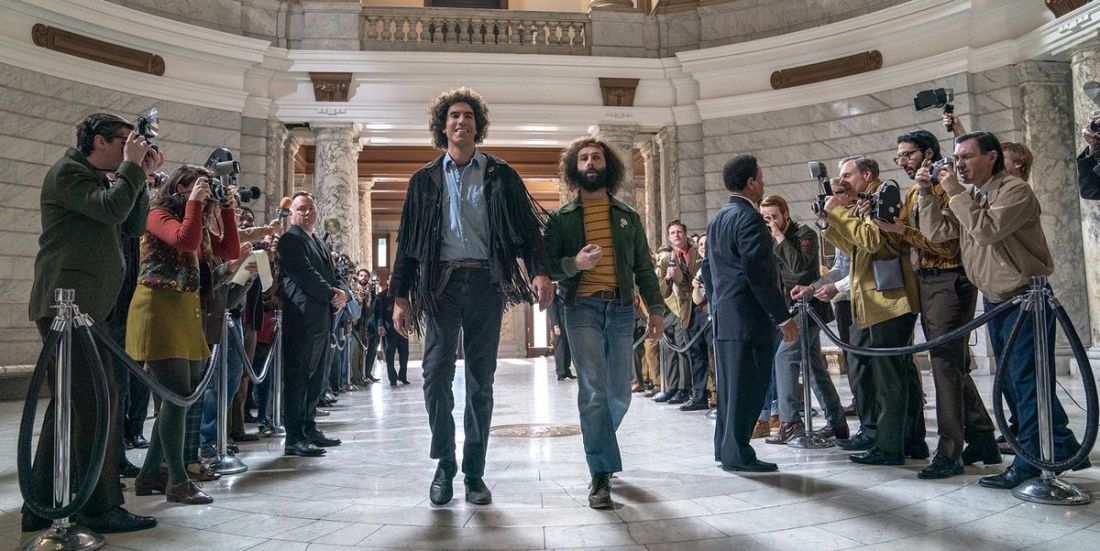
It’s hard to believe that this film was made prior to the BLM protests, because it’s incredibly relevant today as history repeats itself fifty years later. Like in 1968, America is faced with the prospect of a deeply unpopular president with a questionable response to the deaths of thousands of citizens. America was (and is) divided between a largely-older generation who sought law and order and a largely-younger generation who saw law and order as unjust in its application. While most of us would agree that people were right to protest the war back then, still there are those who did (and still do) point to the countercultural movement as one devoid of purpose and designed to instigate chaos rather than initiate change. It’s true that the bloody nature of some of the clashes between police and protesters back then undercut some of the intended messages, and their political influence was often seen as negative or counter-productive as a result. In this film Sorkin seeks to rectify some of the damage done (both in 1968 and in 2020) by examining the conditions that led to such violence and getting back to the real issue at hand: the hand of justice overstepping its bounds and attempting to control the free thought of American citizens whose only crime is seeking a better life for themselves and those around them.
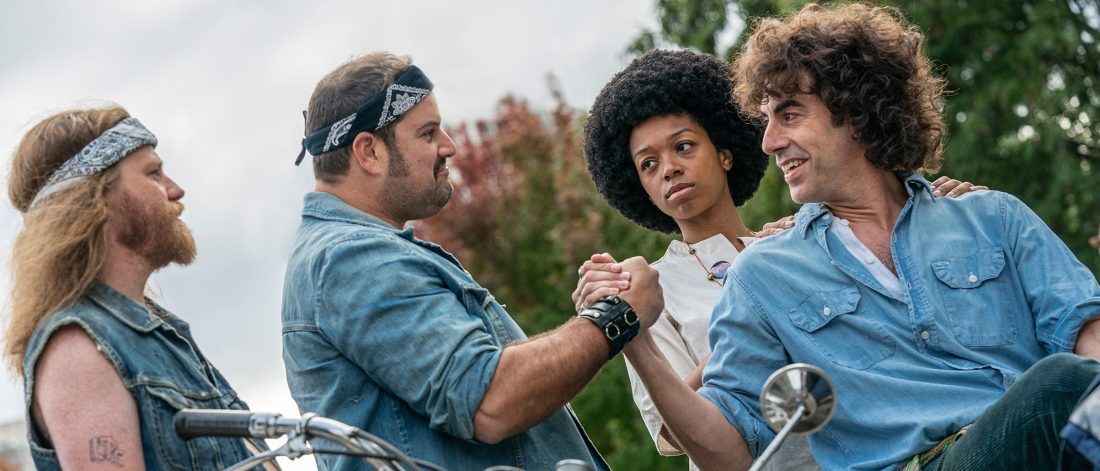
One thing that struck me about Sorkin’s portrayal of the protests is the fractured nature of its participants. As noted early on in the firm, though they were lumped together as the Chicago 7 (or 8, but we’ll get to that later) they represented three separate groups with little affiliation to each other, and with sharply opposing opinions on the state of the country. Despite the prosecution’s attempts to paint them as the “radical Left”, they represented many different beliefs and motivations. Some sought a complete overhaul of the American government; others sought more moderate and gradual reform. Much of the conflict in the film comes when Abbie Hoffman and Tom Hayden trade blows over what the purpose of these protests ought to be: Abbie sought conflict and awareness while Tom wanted direct action. It sadly wasn’t touched upon much in the film, but there are hints of this in the background as the Black Panther Party grapples with their approach after the murders of MLK, Malcolm X and Fred Hampton. MLK and his message of peace may be the one white America remembers today, but he was NOT the only voice leading the civil rights movement – many opposing viewpoints swirled.
Sorkin cleverly brings these issues to the forefront over the course of the trial, as the prosecution attempts to get at the heart of why these protests were taking place to begin with. Their contention is that they existed to pick a fight with the police, and while that wasn’t necessarily true, the idea is difficult to refute because nobody can give a concise answer as to their true purpose. Sometimes even the motivations of a single person are difficult to define: Tom Hayden is unerringly civil and polite the entire film, save for one fateful night where he gives an impassioned plea for the crowd to avenge a fallen comrade who was savagely beaten with police batons. Emotions ran high, leading to unpredictable actions, and while the prosecution paints such actions as brutish and malicious, the truth rests more accurately in chaotic uncertainty. A cornered dog is more likely to bite, after all. In fact, the outcome of the trial is almost a foregone conclusion that Sorkin has little interest in…he spends the bulk of his time making sure that the defendants are given the moral victory in the end, that the American public understands the truth behind their actions and not the lies of the police and the prosecution.
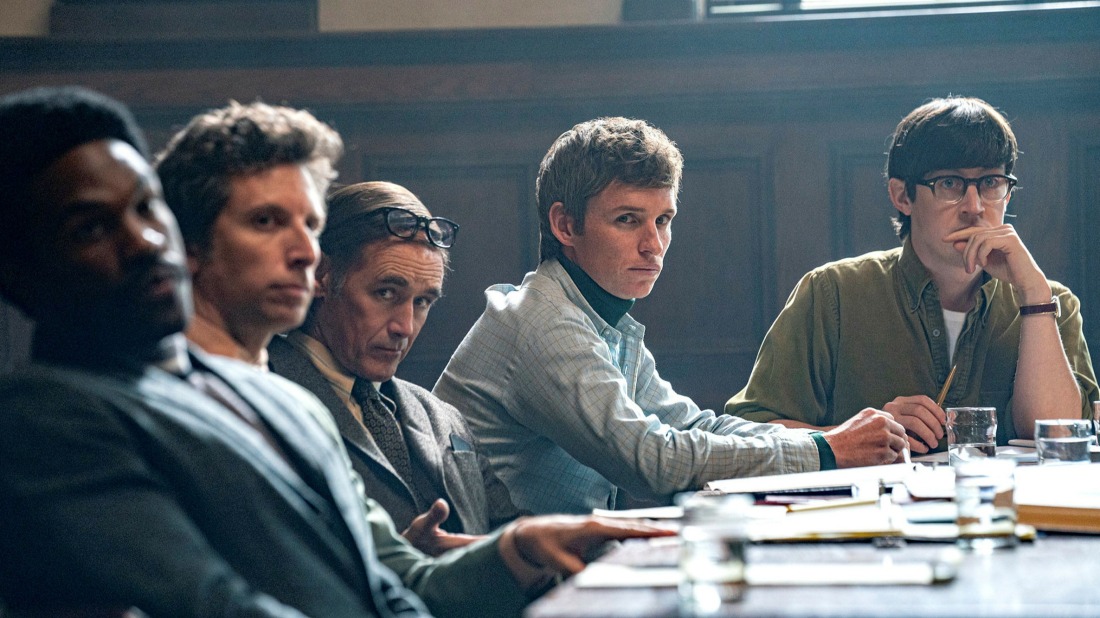
Tom Hayden’s arc is the one who most interests me in the film, because he undergoes the most significant personal and emotional shift. At the beginning he is unerringly respectful for the institutions of the day – even as the justice system works to prosecute him, he shows no malice or ill-will towards them. However, his faith in the system is repeatedly called into question as time goes on. First he is beaten by a group of cops who remove their badges first so they couldn’t be identified. Then he watches as one of his fellow defendants (a black man) is forcibly bound, gagged and restrained just five feet away from him. Then he is forced to watch in horror as a deeply-biased and caustic judge refuses to listen to basic reason and give the defense a fair shake, having already made up his mind before the proceedings even began. Tom’s personal torment reaches a climax in the film’s final scene, as he is chosen to deliver closing remarks to the court…so long as they are respectful and brief. Instead he elects to read a list of names aloud of every man killed in the Vietnam War to-date, proving that he has finally seen through the injustice of the legal system and has turned his back on that institution like his fellow freedom fighters.
In many ways, the film exists to dispel many of the misconceptions people might have about the nature of protests due to the media’s portrayal of them. While the media in 1968 wasn’t quite as sensationalist as it is today, it still largely adhered to the example of the conservative-leaning institutions and advocated for peace and non-violence. As such, many were quick to denounce these Chicago 7 as dirty, lazy hippies who want to shirk their civic duties to serve their country. For much of the trial, the defense is concerned about the image of the defendants…no matter how much they believed in their own innocence, would a jury comprised of pearl-clutching white moderates really be sympathetic to a bunch of foul-mouthed, tie-dye wearing rabble-rousers? The prosecution has a minor crisis of their own as they realize they have inadvertently made Bobby Seale (a Black Panther Party member) into a sympathetic character by treating him like an animal in front of the jury. This kind of hand-wringing makes it clear just how much the media controls the public’s perception of a person or an idea, and how essential it is to control the narrative.
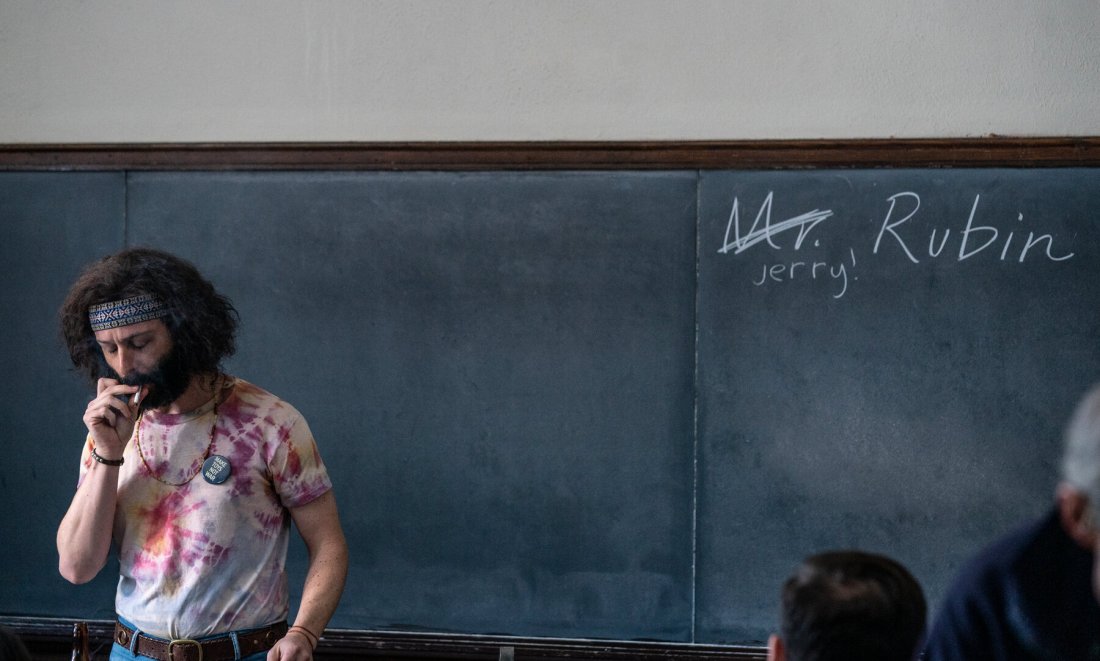
While I appreciate everything this film has to say, it isn’t without its faults. Sorkin’s own beliefs on the matter are readily apparent, and the film comes across as didactic and on-the-nose as a result. It’s less of a straightforward re-telling of events as a heavily-skewed instructional piece designed to stir an emotional response rather than a logical one. And that is part of the problem: logically-speaking, there was a sound argument against the Seven’s indictment that undercuts some of the moral argumentation. Well-intentioned or not, people got hurt at the protests due to their leadership or negligence or whatever you want to call it. The pacing of the film could’ve also been a bit better; it sags a bit in the second act, though it does come roaring back for a satisfying finale. While the editing does a solid job of intercutting between the past and present, Sorkin’s direction doesn’t stand out as particularly special. I was pretty harsh on Sorkin’s directorial debut a couple years back and while this is a far cry from that mess, I still wouldn’t call him a director so much as a writer shooting his own work. Pedantic on my part? Perhaps. But my point stands.
Finally let’s talk about the acting, because holy shit, what an ensemble! It’s difficult to pick a standout (or two, or three), and I certainly don’t envy Netflix’s marketing team who has to put together an awards campaign for just a small handful of these performances. Gun to my head, I would say Mark Rylance and Eddie Redmayne gave my favorite performances with Sacha Baron Cohen not far behind. But everyone is on their A-game, from Frank Langella as the infuriating judge, to Yahya Abdul-Mateen II as the outraged minority voice, to Jeremy Strong as the more carefree and loose-lipped presence, to Michael Keaton in a small but impactful role of quiet disobedience, and many more. It certainly helps that they have great material to work with, as Sorkin humanizes each character beautifully and makes their motivations clear. I was able to connect with each of them in some small way thanks to strong writing and even better performances. This is perhaps the least Sorkin-y of all his scripts: while oftentimes his films often feel like Sorkin talking to himself, here everyone has a distinct voice
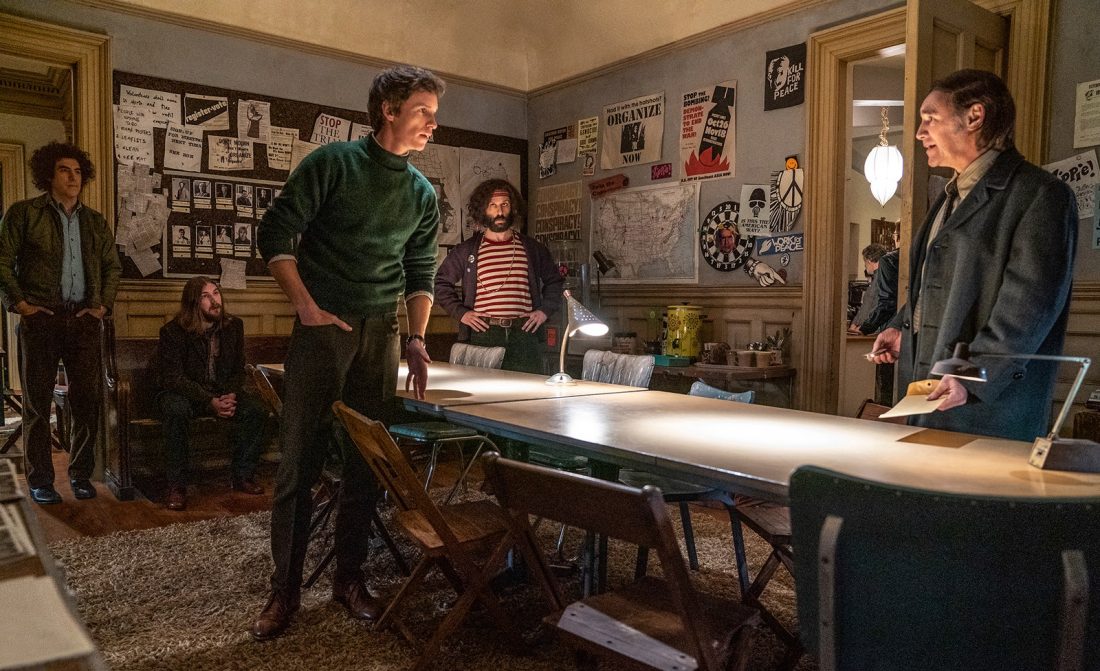
Conclusion
Heavy-handed in its messaging? Yes. Schlocky and melodramatic? Absolutely. Impactful, resonant and relevant to our times? Hell yeah! Aaron Sorkin is back in fine form with this emotional re-telling of an incident specific to the 1960’s yet still applicable to the modern-day. As America reels from a brutal pandemic and careens towards a charged election, it’s a scary time with an uncertain resolution. If there’s any consolation to be found, it’s that reason and compassion always rises to the top, and any attempts to suppress them almost invariably fail. This is no masterpiece, but it’s the perfect film to get people talking about the issues in a civilized manner, and that might be exactly what we need right now.
VERDICT: A-
All image rights belong to Netflix.
Thanks for reading, everybody! This weekend I have the privilege of watching several other awards contenders via online festival screeners, including Minari and One Night in Miami! I will be sure to share my thoughts on those as soon as possible. Hope to see you there, and in the meantime head over to the home page for more film reviews and musings like this one!
-Austin Daniel